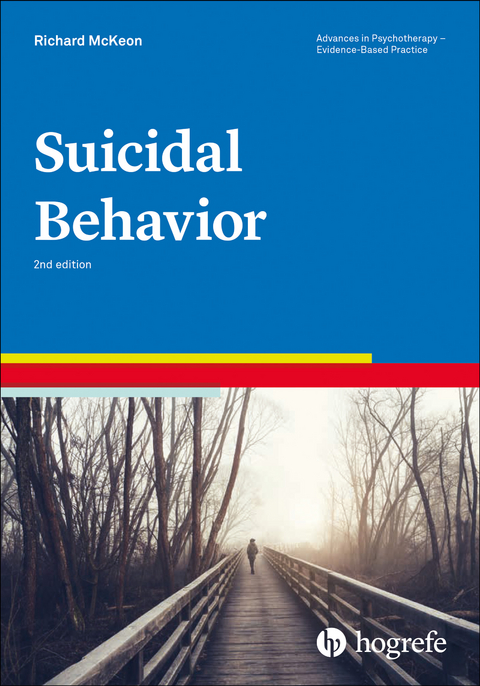
Suicidal Behavior
Hogrefe Publishing (Verlag)
978-0-88937-506-2 (ISBN)
s
Learn how to assess and treat clients at risk of suicide:
*Incorporates the latest research
*Highlights the best risk assessment and treatment practices
*Presents new models explaining the development of suicidal ideation
*Clear guidance on crisis management and documentation
*Full of hands-on tips, case examples, and clinical pearls
With more than 800,000 deaths worldwide each year, suicide is one of the leading causes of death. The second edition of this volume incorporates the latest research, showing which empirically supported approaches to assessment, management, and treatment really help those at risk. Updates include comprehensively updated epidemiological data, the role opioid use problems, personality disorders, and trauma play in suicide, new models explaining the development of suicidal ideation, and the zero suicide model. This book aims to increase clinicians' access to empirically supported interventions for suicidal behavior, with the hope that these methods will become the standard in clinical practice.
The book is invaluable as a compact how-to reference for clinicians in their daily work and as an educational resource for students and for practice-oriented continuing education. It's reader-friendly structure makes liberal use of tables, boxed clinical examples, and clinical vignettes. The book, which also addresses common obstacles in treating individuals at risk for suicide, is an essential resource for anyone working with this high-risk population.
Richard McKeon, PhD, MPH, received his doctorate in clinical psychology from the University of Arizona, and a master of public health in health administration from Columbia University. He has spent most of his career working in community mental health, including 11 years as director of a psychiatric emergency service and 4 years as associate administrator / clinical director of a hospital-based community mental health center in Newton, New Jersey. He established the first evidenced-based treatment program for chronically suicidal borderline patients in the state of New Jersey utilizing Marsha Linehan's Dialectical Behavior Therapy. In 2001, he was awarded an American Psychological Association Congressional Fellowship and worked for US Senator Paul Wellstone, covering health and mental health policy issues. He spent 5 years on the Board of the American Association of Suicidology as Clinical Division Director and has also served on the Board of the Division of Clinical Psychology of the American Psychological Association. He is currently Chief of the Suicide Prevention Branch for the Substance Abuse and Mental Health Services Administration in the US Department of Health and Human Services. He also serves as Co-Chair of the Federal Working Group on Suicide Prevention and participated in the development of the World Suicide Report for the World Health Organization.
1 Description
1.1 Terminology
1.2 Definition
1.3 Differential Diagnosis
1.4 Epidemiology
1.5 Course and Prognosis
1.6 Comorbidities
1.7 Assessment Procedures
2 Theories and Models of Suicidal Behavior
2.1 Neuropsychiatric Theories
2.2 Psychological Theories
3 Risk Assessment and Treatment Planning
3.1 Assessing Suicide Risk and Protective Factors
3.2 Estimating Suicide Risk Level
3.3 Resolving Contradictory Risk Factors
3.4 Understanding the Time Dimension of Suicide Risk
3.5 Documenting Suicidal Risk
4 Treatment
4.1 Methods of Treatment
4.1.1 Multiphase Models
4.1.2 Orientation and Engagement.
4.2 Crisis Intervention and the Management of Acute Risk
4.2.1 Assuring Telephone Accessibility After Hours
4.2.2 Suicide Prevention Hotlines
4.2.3 Emergency Appointment Capability
4.2.4 Use of the Emergency Department
4.2.5 Psychiatric Emergency Services
4.2.6 Involuntary Hospitalization and the Use of the Police
4.2.7 Use of Mobile Outreach Services
4.3 Safety Planning
4.3.1 Involving Family and Friends
4.3.2 Means Restriction
4.3.3 Safety Planning Versus No-Suicide Contracts
4.4 Treatment Techniques
4.4.1 Skills Training
4.4.2 Self-Monitoring/Homework Assignments
4.4.3 Cognitive Interventions
4.4.4 Exposure Treatment
4.4.5 Reducing Perceived Burdensomeness
4.4.6 Failed Belongingness
4.4.7 Bibliotherapy and Online Resources
4.4.8 Outreach and Follow-up
4.4.9 Postvention
4.5 Mechanisms of Action
4.6 Efficacy and Prognosis
4.7 Variations and Combinations of Methods
4.7.1 The Zero Suicide Model
4.7.2 Medication and Psychotherapy
4.7.3 Working with Families
4.7.4 Treatment of Adolescents
4.7.5 Individual and Group Treatment
4.8 Problems in Carrying Out the Treatments
4.8.1 Problems in Communication and Information Gathering
4.8.2 Problems in Continuity of Care
4.8.3 Problems in Initial Risk Assessment
4.8.4 Problems in Collaboration
4.9 Multicultural Issues
5 Case Vignette
6 Case Example
7 Further Reading
8 References
9 Appendices: Tools and Resources
| Erscheinungsdatum | 13.09.2022 |
|---|---|
| Reihe/Serie | Advances in Psychotherapy – Evidence-Based Practice ; 14 |
| Verlagsort | Toronto |
| Sprache | englisch |
| Maße | 177 x 254 mm |
| Themenwelt | Geisteswissenschaften ► Psychologie ► Klinische Psychologie |
| Geisteswissenschaften ► Psychologie ► Persönlichkeitsstörungen | |
| Medizin / Pharmazie ► Medizinische Fachgebiete ► Psychiatrie / Psychotherapie | |
| Schlagworte | DSM-5 • Suicidal behavior • Suicide |
| ISBN-10 | 0-88937-506-2 / 0889375062 |
| ISBN-13 | 978-0-88937-506-2 / 9780889375062 |
| Zustand | Neuware |
| Informationen gemäß Produktsicherheitsverordnung (GPSR) | |
| Haben Sie eine Frage zum Produkt? |
aus dem Bereich


